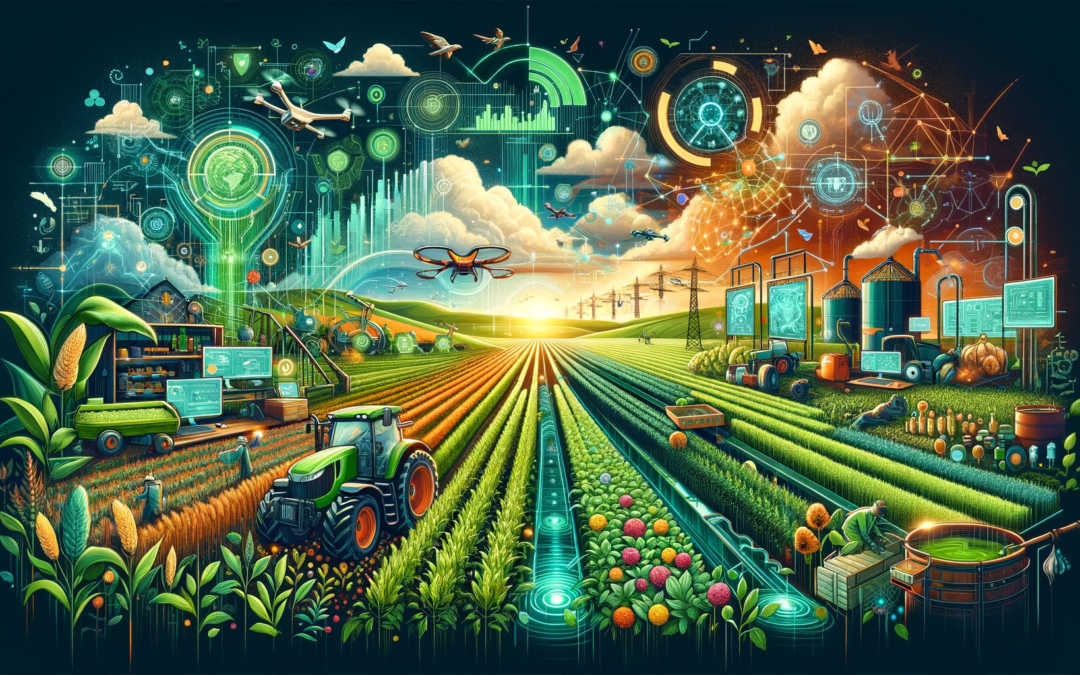As the global population continues to grow, so does the challenge of ensuring sustainable food production and security. With the emergence of artificial intelligence (AI), the agricultural industry is experiencing a revolutionary transformation. In this blog post, we will explore how AI is not only optimizing agricultural practices but also addressing global food challenges, from increasing crop yields to reducing environmental impacts and ensuring food security.
AI in Precision Farming
AI has become a game-changer in modern agriculture, particularly in precision farming. By harnessing the power of AI, farmers can optimize farming practices through soil analysis, crop monitoring, and yield prediction. For example, AI-driven technologies and platforms, such as smart sensors and drones, are revolutionizing the way farmers manage their crops. These tools provide real-time data on soil conditions, crop health, and pest infestations, allowing farmers to make informed decisions and take timely actions.
AI in Resource Management and Sustainability
One of the key benefits of AI in agriculture is its ability to manage resources more efficiently. AI algorithms can analyze vast amounts of data to optimize water usage, fertilizer application, and pest control. By precisely delivering resources where and when they are needed, farmers can reduce waste and minimize environmental impacts. Several successful cases have demonstrated how AI contributes to sustainable farming practices, such as using machine learning to detect diseases in crops and implementing precision irrigation systems to conserve water.
AI in Supply Chain and Distribution
AI tools are also being utilized to enhance the agricultural supply chain, from predictive analytics for demand to optimizing distribution routes. By analyzing various factors, such as weather conditions, market trends, and transportation logistics, AI can help farmers and distributors make better decisions regarding production, storage, and delivery. This not only reduces food waste but also ensures that food reaches consumers in a timely and efficient manner.
AI in Addressing Climate Change Impacts
Climate change poses significant challenges to agriculture, but AI is aiding in adapting farming practices to the changing climate. Researchers are using AI to develop climate-resilient crops that can withstand extreme weather conditions and pest outbreaks. AI is also being used to optimize irrigation schedules and develop farming techniques that are more resilient to droughts and floods. These advancements are crucial in ensuring food security in the face of a changing climate.
Challenges and Ethical Considerations
While AI offers immense potential in agriculture, there are also challenges and ethical considerations to address. Data privacy, access to technology, and the potential impacts on traditional farming communities are among the key concerns. It is important to ensure that AI is used responsibly and ethically, with measures in place to protect farmers’ livelihoods and prevent further inequalities. Collaboration between technology developers, policymakers, and farming communities is essential to navigate these challenges.
The Future of AI in Agriculture and Food Security
The future of AI in agriculture is promising. As technology continues to evolve, we can expect further advancements in AI-driven farming solutions. From autonomous robots that perform tasks like planting and harvesting to AI-powered decision support systems, the possibilities are endless. However, it is crucial to strike a balance between technological advancement and sustainable, ethical practices. As we embrace AI in agriculture, we must ensure that it serves as a tool to enhance food security while preserving the environment and supporting local communities.
Engaging with the Audience
We invite our readers to share their thoughts and experiences with AI-driven agriculture and food security initiatives. Let’s engage in discussions about the potential benefits and challenges of integrating AI into agriculture. How do you envision the future of farming in the era of advanced AI? Join the conversation and be a part of shaping the future of sustainable agriculture and food security.
Conclusion
AI is revolutionizing sustainable agriculture and playing a crucial role in ensuring global food security. From precision farming to resource management, supply chain optimization, and climate adaptation, AI is transforming every aspect of the agricultural industry. As we move forward, it is essential to embrace AI while considering the ethical implications and ensuring that sustainable practices remain at the forefront. By harnessing the power of AI, we can feed the future and create a more resilient and sustainable food system for generations to come.
Images: Include images or graphics showcasing AI applications in agriculture, such as precision farming tools, resource management systems, and supply chain optimization platforms. Use infographics to illustrate the impact of AI on sustainable agriculture and food security.
SEO Elements: AI in sustainable agriculture, AI in food security, AI-driven farming solutions.
Meta Description: Discover how AI is reshaping agriculture and addressing food security challenges, revolutionizing sustainable farming practices for a better future.










